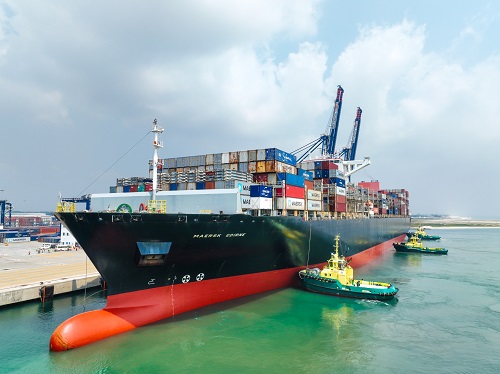Mobereola: Why We Are Involving UN, IMO on Negotiations to End War Risk Insurance on Imports

CONTAINER VESSEL
By Francis Ugwoke
The Director General of the Nigerian Maritime Administration and Safety Agency (NIMASA), Dr. Dayo Mobereola, on Monday explained why the apex maritime agency is involving the United Nations and the International Maritime Organisation (IMO) in the efforts to end the war risk insurance premiums being charged on Nigerian imports.
Liner conferences involved in affreightment of cargoes to Nigeria collect war risk insurance charges on the items to cover the costs in case of piracy on the Gulf of Guinea or Nigerian waters.
The shipping companies also speculated to be collecting the war risk charges in cases of high political tension in countries where they deliver goods.
But what is worrisome is that even with no piracy attacks in the territorial waters and Gulf of Guinea, the shipping lines continue to impose the charges on imports.
Worried by the charges coming at a time of complete peace in GoG and Nigeria, the Director General of NIMASA, told newsmen that his agency had to approach the UN and the IMO for their intervention.
Speaking to maritime journalists in Lagos, Mobereola described the insurance companies as cartel who may not want to end the premiums without the intervention of the IMO and the UN.
The DG said, “One of the points I raised at the Chartham House is how do we reduce the war risk premium and in all honesty, Nigeria alone cannot do it.
“We need International Maritime Organisation (IMO) to be with us because it is a cartel on its own. They are making so much money and would rather keep it as it is even if we have zero privacy, no sea robbery for the next 10 years.
“If we don’t force the issue they will continue to charge us but in order to force the issue, we want our international partners to meet these insurance companies and tell them that in the past three years, there has not been piracy, sea robbery and therefore these war risk premiums must come down.
“And if it comes down, it reduces the freight cost for our import and export. We have engaged them, we are taking them to the United Nations and the UN will support us and we would be able to take it to the insurance who would have no choice but to reduce it. They know there is no piracy but they are just benefitting from it”.
The Director General of the Nigerian Maritime Administration and Safety Agency (NIMASA), Dr. Dayo Mobereola, on Monday explained why the apex maritime agency is involving the United Nations and the International Maritime Organisation (IMO) in the efforts to end the war risk insurance premiums being charged on Nigerian imports.
Liner conferences involved in affreightment of cargoes to Nigeria collect war risk insurance charges on the items to cover the costs in case of piracy on the Gulf of Guinea or Nigerian waters.
The shipping companies also speculated to be collecting the war risk charges in cases of high political tension in countries where they deliver goods.
But what is worrisome is that even with no piracy attacks in the territorial waters and Gulf of Guinea, the shipping lines continue to impose the charges on imports.
Worried by the charges coming at a time of complete peace in GoG and Nigeria, the Director General of NIMASA, told newsmen that his agency had to approach the UN and the IMO for their intervention.
Speaking to maritime journalists in Lagos, Mobereola described the insurance companies as cartel who may not want to end the premiums without the intervention of the IMO and the UN.
The DG said, “One of the points I raised at the Chartham House is how do we reduce the war risk premium and in all honesty, Nigeria alone cannot do it.
“We need International Maritime Organisation (IMO) to be with us because it is a cartel on its own. They are making so much money and would rather keep it as it is even if we have zero privacy, no sea robbery for the next 10 years.
“If we don’t force the issue they will continue to charge us but in order to force the issue, we want our international partners to meet these insurance companies and tell them that in the past three years, there has not been piracy, sea robbery and therefore these war risk premiums must come down.
“And if it comes down, it reduces the freight cost for our import and export. We have engaged them, we are taking them to the United Nations and the UN will support us and we would be able to take it to the insurance who would have no choice but to reduce it. They know there is no piracy but they are just benefitting from it”.
FOLLOW US
